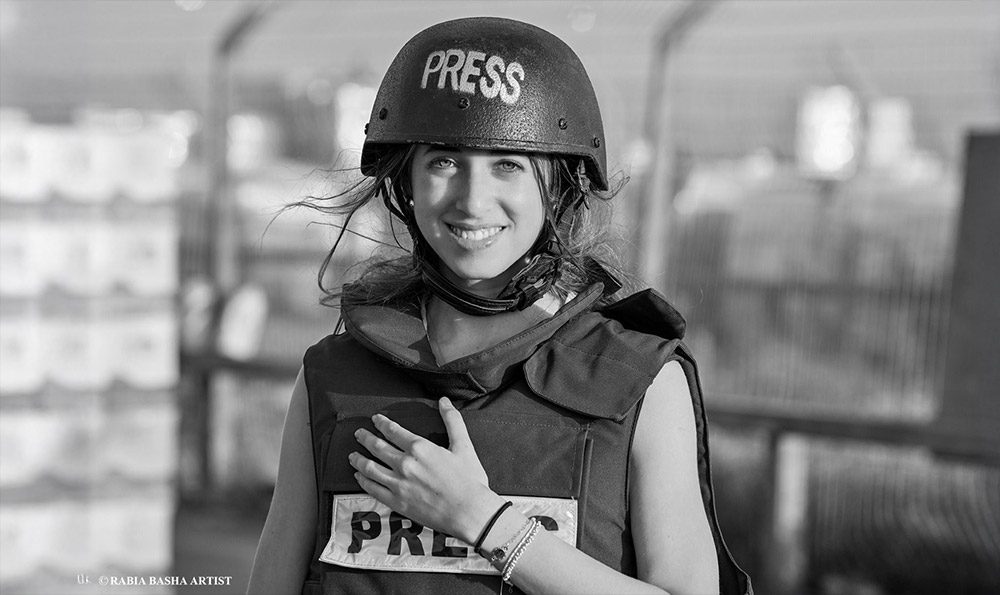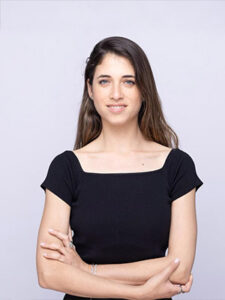Shalem Alum Speaks to the Arab World, In a Language It Can Understand

If there’s an upside to spending time in an air-raid shelter, it’s that there’s lots of time to think. And if you’re Herut Davidson ’23 and it’s the middle of a war with Iran, there’s lots of time to get frustrated, as well. “I kept saying to myself, in this age of social media, it makes no sense that Arabs around the world have such a skewed picture of Israel’s role in this war. It’s crazy that they don’t know that what Israelis want is really to live in peace. Unless,” she concludes, “there are no Israelis telling them that, in a language they can understand.”
A day later, she uploaded her first video to TikTok. In it, she explains the experience of riding out rocket attacks, in fluent Arabic. “That first video got zero views,” says the 28-year-old Herut, who learned the language while studying in Shalem’s Department of Middle Eastern and Islamic Studies. “It’s a good thing I’m not easily deterred.”
Indeed. For her next video, uploaded the next day, she ditched the behind-the-scenes-narration in favor of a close-up of herself speaking directly to the camera. That video earned almost 80,000 views; within three weeks, she’d hit three million eyeballs. “At that point,” she recalls, “I realized I had this enormous power in my hands. Young Arabs around the world were listening. Clearly, I had to keep talking.”
As for what to talk about, Herut’s videos—which she now posts on both TikTok and Instagram, with plans to expand to other platforms soon—are a mix of current events and what she calls “everyday Israeli life.” The common thread is an unmediated, authentic, and unapologetic approach—kind of, she says with a smile, like “Shalem’s approach to reading classic texts.” In an early video, she tours a Tel Aviv building damaged by an Iranian missile, showing how Israelis from all walks of life came together to help clean the site. In another, she stands with a helmet and bullet-proof vest on the Gazan side of Kerem Shalom Crossing, documenting the incoming flow of humanitarian aid. “Look at how much aid is going in,” she says. “So what’s the problem? Simple: Hamas is stealing it. [You can see that] the propaganda that Israel is starving the Gazans is a lie.” Throughout, her astounding ease with Arabic—as a young Jewish Israeli woman, and as a Jew of Ashkenazi descent—makes Herut a unique combination of familiar and fascinating, and a highly compelling spokesperson.
Notably, one of her most popular videos involves no commentary at all. Instead, it offers an inside look at a Jewish Israeli wedding. “It was a beautiful, uplifting side of Israeli life that the Arab world doesn’t see. All I had to do was turn on the camera. It’s the best kind of diplomacy,” Davidson says. To most Israelis, winning the battle of public perception seems like a lost cause. Herut insists that she knows where they’re coming from.
When war broke out on October 7th, Herut was in New York, where she’d gone after participating in the summer’s Koret-Shalem Peoplehood Project delegation to San Francisco. Determined to find a way to help her country from afar—“If I couldn’t help on the home front,” she says, “I wanted to fight in the war of ideas”—she volunteered to visit West Coast campuses as part of Israel-is, an apolitical, grassroots initiative that works to improve Israel’s image abroad. Everywhere she went, she explains, she was struck by not only how connected the Jewish community in the United States felt to Israel, but also how powerful the anti-Israel messaging had become.
“There are tons of people whose job it is to get up in the morning and make Israel look bad,” she says. “Countering that isn’t easy, especially on social media. It’s not easy for truth and nuance to break through all the noise. But that doesn’t mean we should stop trying. The opposite: We all need to use our particular talents to get the real story out.”

Herut Davidson ’23
And to judge by the level of engagement her videos receive, Herut is managing to do just that. Indeed, her videos regularly earn hundreds of responses, “most of which are negative, to be sure, but there are also many positive or just curious ones from throughout the Arab world,” she says. And thanks to a Gracefield Scholarship from Shalem, she hopes to increase her engagement even more in the months to come: This September, she participated in a two-week residency at the college designed to give young entrepreneurs and creators a key push. “Normally, I wouldn’t be able to devote that kind of time to thinking about how to grow my venture and deepen its impact,” says Herut, who currently works as a strategic consultant for nonprofits. “Being in the place where I first learned Arabic made the experience even more meaningful.” In the months to come, Herut is also hoping to launch a podcast—in Arabic, of course—with a “tzadalnik,” or a former member of the Southern Lebanese militia that supported Israel in the country’s civil war. She and the tzadalnik, Miryam, produced a number of joint videos during Israel’s war with Hezbollah, and are currently seeking donors to enable an expanded reach.
“Growing up, I had lots of experiences in which I realized that Jews and Arabs in Israel live in parallel worlds,” she says. “I always wanted to help change that. Shalem gave me the tools—and is still helping me now—to make that difference in and for Israel, and for that I’ll always be grateful.”



